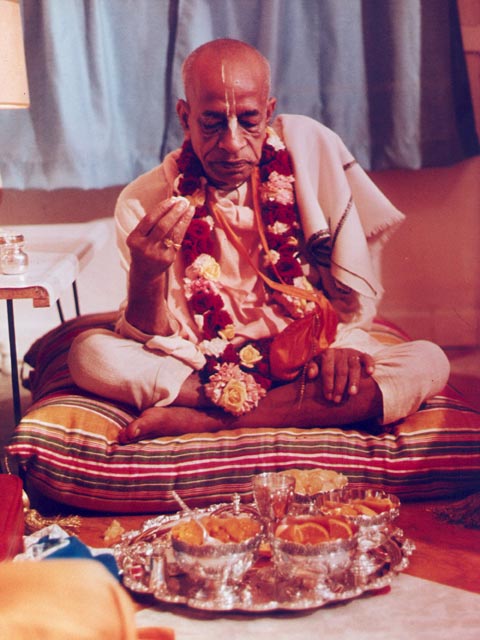
In the Padma Purāṇa there is a statement of submission in feeling by devotees
praying to the Lord: “My Lord, I know that young girls have natural affection
for young boys, and that young boys have natural affection for young girls.
I am praying at Your lotus feet that my mind may become attracted unto You in the same spontaneous way.”
More
B H A K T I (Devotional Service). part 8.
25 Dec 2012 Leave a comment
in Achintya-Bheda-Abheda Tattva, Bhakti Rasamrta Sindhu, Gaudiya Vaisnava Acaryas - Guru Vakya, Hari-Bhakti-sudhodaya, His Divine Grace AC Bhakti Vedanta Swami Srila Prabhupada, Nectar of Devotion, Padma Purana, Puranas, Skanda Purana, Sri Brahma Madhva Gaudiya Vaisnavism, Sri Krishna Bhagavan - Supreme Personality of Godhead, Sri Krishna Chaitanya MahaPrabhu, Srila Prabhupada, Srimad Bhagavatam Tags: A. C. Bhaktivedanta Swami Prabhupada, Bhagavad Gita, Bhagavata, Bhagavata Purana, Bhakti, Brahman, Chaitanya Charitamrita, Chaitanya Mahaprabhu, Chant, Deity, Gaudiya Vaisnavism, Hare Kṛṣṇa, Hare Krishna, Hare Krishna Mahamantra, International Society for Krishna Consciousness, ISKCON, Krishna, Krishna Consciousness, Krishna the Supreme Personality of Godhead, Krsna, Lord, Lord Caitanya, Lord Kṛṣṇa, Nectar of Devotion, Padma Purana, Sri Caitanya MahaPrabhu, sri krishna, Sri Krishna Chaitanya Mahaprabhu, Srila Prabhupada, srimad bhagavad gita, Srimad Bhagavatam, Svayam Bhagavan, Vaiṣṇava, Vaishnavism, Vishnu, Vrindavan
B H A K T I (Devotional Service). part 7.
19 Dec 2012 Leave a comment
in Achintya-Bheda-Abheda Tattva, Bhagavad-Gītā As It Is, Bhakti Rasamrta Sindhu, Gaudiya Vaisnava Acaryas - Guru Vakya, Hare Krishna Mahamantra, His Divine Grace AC Bhakti Vedanta Swami Srila Prabhupada, Krishna Consciousness, Nectar of Devotion, Sri Brahma Madhva Gaudiya Vaisnavism, Sri Caitanya Charitamrita, Sri Krishna Bhagavan - Supreme Personality of Godhead, Sri Krishna Chaitanya MahaPrabhu, Srila Prabhupada, Srimad Bhagavad Gita, Srimad Bhagavatam, Vedanta, Vedāḥ - Vedic Knowledge Tags: A. C. Bhaktivedanta Swami Prabhupada, Bhagavad Gita, Bhagavadgita, Bhagavata Purana, Bhakti, Brahman, Chaitanya Charitamrita, Chaitanya Mahaprabhu, Consciousness, Gaudiya Vaisnavism, Goloka, Gosvāmī, Hare Kṛṣṇa, Hare Krishna, Hare Krishna Mahamantra, Hare Krsna, International Society for Krishna Consciousness, ISKCON, Krishna, Krishna Consciousness, Krishna the Supreme Personality of Godhead, Krsna, Lord, Lord Caitanya, Lord Kṛṣṇa, Lord Śrī Kṛṣṇa, Maya, Mayapur, Padma Purana, Pāñcajanya, Religion and Spirituality, sri caitanya caritamrta, Sri Caitanya MahaPrabhu, sri krishna, Sri Krishna Chaitanya Mahaprabhu, Srila Prabhupada, srimad bhagavad gita, Srimad Bhagavatam, Svayam Bhagavan, Vaiṣṇava, Vaishnavism, Vedas, Vishnu, Vrindavan
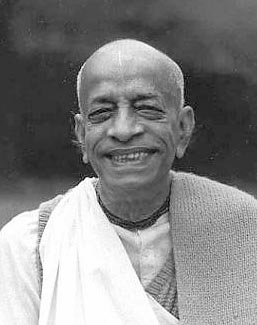
kṛṣṇa-bhakti — abhidheya, sarva-śāstre kaya
ataeva muni-gaṇa kariyāche niścaya
A human being’s activities should be centered only on devotional service to Lord Kṛṣṇa. That is the verdict of all Vedic literatures, and all saintly people have firmly concluded this. (CC-2:22:5).
More
B H A K T I (Devotional Service). part 6.
16 Dec 2012 Leave a comment
in Achintya-Bheda-Abheda Tattva, Gaudiya Vaisnava Acaryas - Guru Vakya, His Divine Grace AC Bhakti Vedanta Swami Srila Prabhupada, Krishna Consciousness, Sri Brahma Madhva Gaudiya Vaisnavism, Sri Caitanya Charitamrita, Sri Krishna Bhagavan - Supreme Personality of Godhead, Sri Krishna Chaitanya MahaPrabhu, Srila Prabhupada, Srimad Bhagavad Gita, Srimad Bhagavatam, Vedanta Tags: A. C. Bhaktivedanta Swami Prabhupada, Chaitanya Charitamrita, Chaitanya Mahaprabhu, Fruit, Gaudiya Vaisnavism, Godhead, Hare Kṛṣṇa, Hare Krishna, Hare Krishna Mahamantra, International Society for Krishna Consciousness, ISKCON, Krishna, Krishna Consciousness, Krishna the Supreme Personality of Godhead, Lord Caitanya, sri caitanya caritamrta, Sri Caitanya MahaPrabhu, sri krishna, Sri Krishna Chaitanya Mahaprabhu, Srila Prabhupada, Srimad Bhagavatam, Svayam Bhagavan, Vaiṣṇava, Vishnu
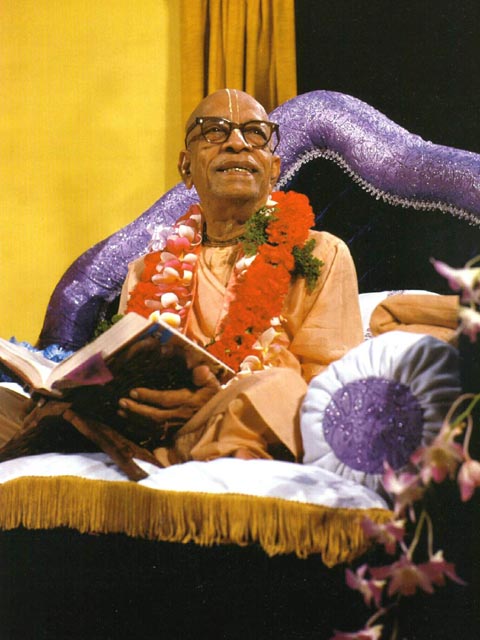 In many places devotional service has been compared to a creeper.
In many places devotional service has been compared to a creeper.
One has to sow the seed of the devotional creeper, bhakti-latā, within his heart.
As he regularly hears and chants, the seed will fructify and gradually grow
into a mature plant and then produce the fruit of devotional service,
namely love of Godhead, which the gardener (mālā-kāra)
can then enjoy without impediments. (Sri Caitanya Caritamrta).
More
B H A K T I (Devtional Service). part 5.
06 Oct 2012 Leave a comment
in Achintya-Bheda-Abheda Tattva, Bhagavad-Gītā As It Is, Bhakti Rasamrta Sindhu, Brahmanda Purana, Gaudiya Vaisnava Acaryas - Guru Vakya, Hare Krishna Mahamantra, Hari-Bhakti-sudhodaya, His Divine Grace AC Bhakti Vedanta Swami Srila Prabhupada, Krishna Consciousness, Nectar of Devotion, Padma Purana, Puranas, Skanda Purana, Sri Brahma Madhva Gaudiya Vaisnavism, Sri Caitanya Charitamrita, Sri Krishna Bhagavan - Supreme Personality of Godhead, Sri Krishna Chaitanya MahaPrabhu, Srila Prabhupada, Srimad Bhagavad Gita, Srimad Bhagavatam Tags: A. C. Bhaktivedanta Swami Prabhupada, Bhagavad Gita, Bhagavata, Bhagavata Purana, Bhakti, Brahman, Chaitanya Charitamrita, Chaitanya Mahaprabhu, Chant, Gaudiya Vaisnavism, Goloka, Gosvāmī, Hare Kṛṣṇa, Hare Krishna, Hare Krishna Mahamantra, Hare Krsna, International Society for Krishna Consciousness, ISKCON, Krishna, Krishna Consciousness, Krishna the Supreme Personality of Godhead, Krsna, Lord Caitanya, Lord Kṛṣṇa, Mayapur, Padma Purana, sri caitanya caritamrta, Sri Caitanya MahaPrabhu, sri krishna, Srila Prabhupada, srimad bhagavad gita, Srimad Bhagavatam, Svayam Bhagavan, Vaiṣṇava, Vaishnavism, Vishnu, Vrindavan
The attitude of the disciple should be to satisfy the bona fide spiritual master.
Then it will be very easy for him to understand spiritual knowledge.
This is confirmed in the Vedas, and Rūpa Gosvāmī will further explain
that for a person who has unflinching faith in God and the spiritual master,
everything becomes revealed very easily. (The Nectar of Devotion). More
B H A K T I (Devtional Service). part 4.
05 Oct 2012 Leave a comment
in Achintya-Bheda-Abheda Tattva, Bhagavad-Gītā As It Is, Bhakti Rasamrta Sindhu, Gaudiya Vaisnava Acaryas - Guru Vakya, Hare Krishna Mahamantra, His Divine Grace AC Bhakti Vedanta Swami Srila Prabhupada, Krishna Consciousness, Nectar of Devotion, Nectar Of Instruction, Sri Brahma Madhva Gaudiya Vaisnavism, Sri Caitanya Charitamrita, Sri Krishna Bhagavan - Supreme Personality of Godhead, Sri Krishna Chaitanya MahaPrabhu, Srila Prabhupada, Srimad Bhagavad Gita Tags: A. C. Bhaktivedanta Swami Prabhupada, Bhagavad Gita, Bhagavata, Bhagavata Purana, Bhakti, Brahman, Chaitanya Charitamrita, Chaitanya Mahaprabhu, Chant, Gaudiya Vaisnavism, Goloka, Gosvāmī, Hare Krishna, Hare Krishna Mahamantra, Hare Krsna, International Society for Krishna Consciousness, ISKCON, Krishna, Krishna Consciousness, Krishna the Supreme Personality of Godhead, Krsna, Lord Caitanya, Lord Kṛṣṇa, Mayapur, sri caitanya caritamrta, Sri Caitanya MahaPrabhu, sri krishna, Sri Krishna Chaitanya Mahaprabhu, Srila Prabhupada, srimad bhagavad gita, Srimad Bhagavatam, Svayam Bhagavan, Vaiṣṇava, Vaishnavism, Vishnu, Vrindavan
Śuddha-bhakti, the activity of the soul proper, in other words, engagement in the transcendental loving service of the Lord, is performed in a liberated condition.
(The Nectar of Instruction). More
B H A K T I (Devotional Service). part 3.
04 Oct 2012 Leave a comment
in Achintya-Bheda-Abheda Tattva, Bhagavad-Gītā As It Is, Bhakti Rasamrta Sindhu, Gaudiya Vaisnava Acaryas - Guru Vakya, His Divine Grace AC Bhakti Vedanta Swami Srila Prabhupada, Krishna Consciousness, Nectar of Devotion, Nectar Of Instruction, Sri Brahma Madhva Gaudiya Vaisnavism, Sri Caitanya Charitamrita, Sri Krishna Bhagavan - Supreme Personality of Godhead, Sri Krishna Chaitanya MahaPrabhu, Srila Prabhupada, Srila Sanatan Goswami, Srimad Bhagavad Gita, Srimad Bhagavatam, Śrīla Rūpa Gosvāmī Tags: A. C. Bhaktivedanta Swami Prabhupada, Bhagavad Gita, Bhagavata Purana, Bhakti, Brahman, Chaitanya Charitamrita, Chaitanya Mahaprabhu, Gaudiya Vaisnavism, Goloka, Gosvāmī, Hare Kṛṣṇa, Hare Krishna, Hare Krishna Mahamantra, International Society for Krishna Consciousness, ISKCON, Krishna, Krishna Consciousness, Krishna the Supreme Personality of Godhead, Lord Caitanya, Lord Kṛṣṇa, Mayapur, sri caitanya caritamrta, sri krishna, Sri Krishna Chaitanya Mahaprabhu, Srila Prabhupada, srimad bhagavad gita, Srimad Bhagavatam, Svayam Bhagavan, Vaiṣṇava, Vaishnavism, Vishnu, Vrindavan
 “atyāhāraḥ prayāsaś ca
“atyāhāraḥ prayāsaś ca
prajalpo niyamāgrahaḥ
jana-sańgaś ca laulyaḿ ca
ṣaḍbhir bhaktir vinaśyati”
One’s devotional service is spoiled when one becomes too entangled in the following six activities:
(1) eating more than necessary or collecting more funds than required;
(2) overendeavoring for mundane things that are very difficult to obtain;
(3) talking unnecessarily about mundane subject matters;
(4) Practicing the scriptural rules and regulations only for the sake of following them
and not for the sake of spiritual advancement,
or rejecting the rules and regulations of the scriptures
and working independently or whimsically;
(5) associating with worldly-minded persons
who are not interested in Kṛṣṇa consciousness; and
(6) being greedy for mundane achievements.
(The Nectar of Instruction). More
B H A K T I (Devotional Service). part 1.
04 Oct 2012 Leave a comment
in Achintya-Bheda-Abheda Tattva, Bhagavad-Gītā As It Is, Bhakti Rasamrta Sindhu, Gaudiya Vaisnava Acaryas - Guru Vakya, His Divine Grace AC Bhakti Vedanta Swami Srila Prabhupada, Krishna Consciousness, Lord Shiva, Nectar of Devotion, Padma Purana, Sri Brahma Madhva Gaudiya Vaisnavism, Sri Krishna Bhagavan - Supreme Personality of Godhead, Sri Krishna Chaitanya MahaPrabhu, Srila Jiva Gosvami, Srila Prabhupada, Srimad Bhagavad Gita, Srimad Bhagavatam, Śrīla Rūpa Gosvāmī Tags: A. C. Bhaktivedanta Swami Prabhupada, Bhagavad Gita, Bhagavata, Bhagavata Purana, Bhakti, Brahman, Chaitanya Charitamrita, Chaitanya Mahaprabhu, Chant, Gaudiya Vaisnavism, Goloka, Gosvāmī, Hare Kṛṣṇa, Hare Krishna, Hare Krishna Mahamantra, International Society for Krishna Consciousness, ISKCON, Krishna, Krishna Consciousness, Krishna the Supreme Personality of Godhead, Krsna, Lord Caitanya, Lord Kṛṣṇa, Mayapur, Padma Purana, sri caitanya caritamrta, Sri Caitanya MahaPrabhu, sri krishna, Sri Krishna Chaitanya Mahaprabhu, Srila Prabhupada, srimad bhagavad gita, Srimad Bhagavatam, Svayam Bhagavan, Vaishnavism, Vishnu, Vrindavan
 There are six characteristics of pure devotional service, which are as follows:
There are six characteristics of pure devotional service, which are as follows:
(1) Pure devotional service brings immediate relief from all kinds of material distress.
(2) Pure devotional service is the beginning of all auspiciousness.
(3) Pure devotional service automatically puts one in transcendental pleasure.
(4) Pure devotional service is rarely achieved.
(5) Those in pure devotional service deride even the conception of liberation.
(6) Pure devotional service is the only means to attract Kṛṣṇa.
(The Nectar of Devotion). More
The Glories of Bhakti
03 Oct 2012 Leave a comment
in Achintya-Bheda-Abheda Tattva, Gaudiya Vaisnava Acaryas - Guru Vakya, Hare Krishna Mahamantra, His Divine Grace AC Bhakti Vedanta Swami Srila Prabhupada, Krishna Consciousness, Sri Brahma Madhva Gaudiya Vaisnavism, Sri Krishna Bhagavan - Supreme Personality of Godhead, Sri Krishna Chaitanya MahaPrabhu, Srila Prabhupada, Srimad Bhagavatam Tags: A. C. Bhaktivedanta Swami Prabhupada, Bhagavad Gita, Bhagavata, Bhagavata Purana, Bhakti, Brahman, Chaitanya Charitamrita, Chaitanya Mahaprabhu, Chant, Gaudiya Vaisnavism, Goloka, Gosvāmī, Hare Kṛṣṇa, Hare Krishna, Hare Krishna Mahamantra, International Society for Krishna Consciousness, ISKCON, Krishna, Krishna Consciousness, Krishna the Supreme Personality of Godhead, Krsna, Lord Caitanya, Mayapur, sri caitanya caritamrta, Sri Caitanya MahaPrabhu, sri krishna, Sri Krishna Chaitanya Mahaprabhu, Srila Prabhupada, srimad bhagavad gita, Srimad Bhagavatam, Svayam Bhagavan, Vaiṣṇava, Vaishnavism, Vishnu, Vrindavan
 Anything that changes is called temporary. We should know that beyond these temporary senses are our permanent senses, which are now covered by the material body. The permanent senses, being contaminated by matter, are not acting properly. Bhakti, therefore, involves freeing the senses from this contamination.
Anything that changes is called temporary. We should know that beyond these temporary senses are our permanent senses, which are now covered by the material body. The permanent senses, being contaminated by matter, are not acting properly. Bhakti, therefore, involves freeing the senses from this contamination.
We have our eyes, but without the light of the sun our eyes are of no value. Similarly, without the light of Lord Krishna, or without the grace of the spiritual master, we cannot see things as they are. More
The Significance Of Chanting The Holy Name Of The Lord Without Offenses – Part -3
02 Oct 2012 Leave a comment
in Achintya-Bheda-Abheda Tattva, Gaudiya Vaisnava Acaryas - Guru Vakya, Hare Krishna Mahamantra, His Divine Grace AC Bhakti Vedanta Swami Srila Prabhupada, Krishna Consciousness, Nectar Of Instruction, Sri Brahma Madhva Gaudiya Vaisnavism, Sri Caitanya Charitamrita, Sri Krishna Bhagavan - Supreme Personality of Godhead, Sri Krishna Chaitanya MahaPrabhu, Srila Prabhupada, Srimad Bhagavatam, Vedanta Tags: A. C. Bhaktivedanta Swami Prabhupada, Bhagavad Gita, Bhagavata, Bhagavata Purana, Bhakti, Brahman, Chaitanya Charitamrita, Chaitanya Mahaprabhu, Chant, Gaudiya Vaisnavism, Goloka, Hare Krishna, Hare Krishna Mahamantra, Hare Krsna, International Society for Krishna Consciousness, ISKCON, Krishna, Krishna Consciousness, Krishna the Supreme Personality of Godhead, Krsna, Lord Caitanya, Lord Kṛṣṇa, Mayapur, sri caitanya caritamrta, Sri Caitanya MahaPrabhu, sri krishna, Sri Krishna Chaitanya Mahaprabhu, Srila Prabhupada, srimad bhagavad gita, Srimad Bhagavatam, Svayam Bhagavan, Vaiṣṇava, Vaishnavism, Vishnu, Vrindavan
As for being freed from all sinful reactions by chanting the holy name of Kṛṣṇa only once, one must chant the holy name without committing any offenses. Then chanting one name is sufficient to rescue a living being from all sinful reactions. Such a person who chants the holy name of the Lord offenselessly is very important and woshipable. Indeed, the nine devotional processes, beginning with śravaṇa and kīrtana, can all be attained at once if one simply chants the holy name of the Lord offenselessly.
(Sri Caitanya Caritamrta—–2:15:107—–purport). More
The Significance Of Chanting The Holy Name Of The Lord Without Offenses – Part -2
02 Oct 2012 Leave a comment
in Achintya-Bheda-Abheda Tattva, Gaudiya Vaisnava Acaryas - Guru Vakya, Hare Krishna Mahamantra, His Divine Grace AC Bhakti Vedanta Swami Srila Prabhupada, Krishna Consciousness, Nectar Of Instruction, Sri Brahma Madhva Gaudiya Vaisnavism, Sri Caitanya Charitamrita, Sri Krishna Bhagavan - Supreme Personality of Godhead, Sri Krishna Chaitanya MahaPrabhu, Srila Prabhupada, Srimad Bhagavatam Tags: A. C. Bhaktivedanta Swami Prabhupada, Bhagavad Gita, Bhagavata, Bhagavata Purana, Bhakti, Brahman, Chaitanya Charitamrita, Chaitanya Mahaprabhu, Gaudiya Vaisnavism, Goloka, Hare Krishna, Hare Krishna Mahamantra, Hare Krsna, International Society for Krishna Consciousness, ISKCON, Krishna, Krishna Consciousness, Krishna the Supreme Personality of Godhead, Krsna, Lord Caitanya, Lord Kṛṣṇa, Mayapur, sri caitanya caritamrta, Sri Caitanya MahaPrabhu, Srila Prabhupada, srimad bhagavad gita, Srimad Bhagavatam, Svayam Bhagavan, Vaiṣṇava, Vaishnavism, Vishnu, Vrindavan
 The simple process of offenselessly chanting and hearing the holy name of the Lord will gradually promote one very soon to the stage of emancipation. There are three stages in chanting the holy name of the Lord. The first stage is the offensive chanting of the holy name, and the second is the reflective stage of chanting the holy name. The third stage is the offenseless chanting of the holy name of the Lord. In the second stage only, the stage of reflection, between the offensive and offenseless stages, one automatically attains the stage of emancipation. And in the offenseless stage, one actually enters into the kingdom of God, although physically he may apparently be within the material world. To attain the offenseless stage, one must be on guard in the following manner.
The simple process of offenselessly chanting and hearing the holy name of the Lord will gradually promote one very soon to the stage of emancipation. There are three stages in chanting the holy name of the Lord. The first stage is the offensive chanting of the holy name, and the second is the reflective stage of chanting the holy name. The third stage is the offenseless chanting of the holy name of the Lord. In the second stage only, the stage of reflection, between the offensive and offenseless stages, one automatically attains the stage of emancipation. And in the offenseless stage, one actually enters into the kingdom of God, although physically he may apparently be within the material world. To attain the offenseless stage, one must be on guard in the following manner.
When we speak of hearing and chanting, it means that not only should one chant and hear of the holy name of the Lord as Rāma, Kṛṣṇa (or systematically the sixteen names Hare Kṛṣṇa, Hare Kṛṣṇa, Kṛṣṇa Kṛṣṇa, Hare Hare/ Hare Rāma, Hare Rāma, Rāma Rāma, Hare Hare), but one should also read and hear the Bhagavad-gītā and Śrīmad-Bhāgavatam in the association of devotees.
(Srimad Bhagavatam—–2:2:30—–purport). More
The Significance Of Chanting The Holy Name Of The Lord Without Offenses – Part -1
02 Oct 2012 Leave a comment
in Achintya-Bheda-Abheda Tattva, Hare Krishna Mahamantra, His Divine Grace AC Bhakti Vedanta Swami Srila Prabhupada, Krishna Consciousness, Padma Purana, Puranas, Sri Brahma Madhva Gaudiya Vaisnavism, Sri Caitanya Charitamrita, Sri Krishna Bhagavan - Supreme Personality of Godhead, Sri Krishna Chaitanya MahaPrabhu, Srila Jiva Gosvami, Srila Prabhupada, Srimad Bhagavad Gita, Srimad Bhagavatam, Vedanta Tags: A. C. Bhaktivedanta Swami Prabhupada, Bhagavad Gita, Bhagavata, Bhagavata Purana, Bhakti, Brahman, Chaitanya Charitamrita, Chaitanya Mahaprabhu, Chant, Gaudiya Vaisnavism, Goloka, Hare Kṛṣṇa, Hare Krishna, Hare Krishna Mahamantra, International Society for Krishna Consciousness, ISKCON, Krishna, Krishna Consciousness, Krishna the Supreme Personality of Godhead, Krsna, Lord Caitanya, Lord Kṛṣṇa, Mayapur, Padma Purana, sri caitanya caritamrta, Sri Caitanya MahaPrabhu, sri krishna, Sri Krishna Chaitanya Mahaprabhu, Srila Prabhupada, srimad bhagavad gita, Srimad Bhagavatam, Svayam Bhagavan, Vaiṣṇava, Vaishnavism, Vishnu, Vrindavan
When Lord Caitanya was born during the lunar eclipse, all India was roaring with the holy sound of Hare Kṛṣṇa, Hare Kṛṣṇa, Kṛṣṇa Kṛṣṇa, Hare Hare/ Hare Rāma, Hare Rāma, Rāma Rāma, Hare Hare. These sixteen names of the Lord are mentioned in many Purāṇas and Upaniṣads, and they are described as the Tāraka-brahma nāma of this age. It is recommended in the śāstras that offenseless chanting of these holy names of the Lord can deliver a fallen soul from material bondage. There are innumerable names of the Lord both in India and outside, and all of them are equally good because all of them indicate the Supreme Personality of Godhead. But because these sixteen are especially recommended for this age, people should take advantage of them and follow the path of the great ācāryas who attained success by practicing the rules of the śāstras (revealed scriptures).
(Srimad Bhagavatam—–introduction). More
The Importance of Congregational Chanting
02 Oct 2012 Leave a comment
in Achintya-Bheda-Abheda Tattva, Bhagavad-Gītā As It Is, Bhakti Rasamrta Sindhu, Gaudiya Vaisnava Acaryas - Guru Vakya, Hare Krishna Mahamantra, His Divine Grace AC Bhakti Vedanta Swami Srila Prabhupada, Krishna Consciousness, Nectar of Devotion, Puranas, Sri Brahma Madhva Gaudiya Vaisnavism, Sri Caitanya Charitamrita, Sri Krishna Bhagavan - Supreme Personality of Godhead, Sri Krishna Chaitanya MahaPrabhu, Srila Prabhupada, Srimad Bhagavad Gita, Srimad Bhagavatam, Vedanta Tags: A. C. Bhaktivedanta Swami Prabhupada, Bhagavad Gita, Bhagavadgita, Bhagavata Purana, Bhakti, Brahman, Chaitanya Charitamrita, Chaitanya Mahaprabhu, Chant, Gaudiya Vaisnavism, Hare Kṛṣṇa, Hare Krishna, Hare Krishna Mahamantra, International Society for Krishna Consciousness, ISKCON, Krishna, Krishna Consciousness, Krishna the Supreme Personality of Godhead, Lord Caitanya, Lord Kṛṣṇa, Mayapur, sri caitanya caritamrta, Sri Caitanya MahaPrabhu, sri krishna, Sri Krishna Chaitanya Mahaprabhu, Srila Prabhupada, srimad bhagavad gita, Srimad Bhagavatam, Svayam Bhagavan, Vaiṣṇava, Vaishnavism, Vishnu, Vrindavan
In this age, the congregational chanting of the holy names of the Lord is the prescribed method for waking up. The ways and means are most scientifically presented by Lord Śrī Caitanya Mahāprabhu, and intelligent persons may take advantage of His teachings in order to bring about real peace and prosperity.
(Srimad Bhagavatam–1:1:4–purport). More
The Importance Of Chanting 16 Rounds Of The Hare Krishna Mantra
30 Sep 2012 Leave a comment
in Achintya-Bheda-Abheda Tattva, Bhagavad-Gītā As It Is, Hare Krishna Mahamantra, His Divine Grace AC Bhakti Vedanta Swami Srila Prabhupada, Krishna Consciousness, Sri Brahma Madhva Gaudiya Vaisnavism, Sri Caitanya Charitamrita, Sri Krishna Bhagavan - Supreme Personality of Godhead, Sri Krishna Chaitanya MahaPrabhu, Srila Prabhupada, Srimad Bhagavad Gita, Srimad Bhagavatam, Vedāḥ - Vedic Knowledge Tags: A. C. Bhaktivedanta Swami Prabhupada, Bhagavad Gita, Bhagavadgita, Bhagavata, Bhagavata Purana, Bhakti, Brahman, Chaitanya Charitamrita, Chaitanya Mahaprabhu, Chant, Gaudiya Vaisnavism, Goloka, Gosvāmī, Hare, Hare Kṛṣṇa, Hare Krishna, Hare Krishna Mahamantra, Hare Krsna, International Society for Krishna Consciousness, ISKCON, Krishna, Krishna Consciousness, Krishna the Supreme Personality of Godhead, Krsna, Lord Caitanya, Lord Kṛṣṇa, Mayapur, sri caitanya caritamrta, Sri Caitanya MahaPrabhu, sri krishna, Sri Krishna Chaitanya Mahaprabhu, Srila Prabhupada, srimad bhagavad gita, Srimad Bhagavatam, Svayam Bhagavan, Vaiṣṇava, Vaishnavism, Vishnu, Vrindavan
As far as our ISKCON movement is concerned, we simply ask that one observe the four prohibitive rules, chant sixteen rounds and, instead of indulging in luxurious eating for the tongue, simply accept prasāda offered to the Lord. This does not mean that with our fasting the Lord should also fast. The Lord should be given foodstuff which is as nice as possible. But we should not make it a point to satisfy our own tongues. As far as possible we should accept simple foodstuff, just to keep the body and soul together to execute devotional service.
(Srimad Bhagavatam–4:8:72–purport). More
Chanting The Holy Name Of Lord Krishna – Part 12
29 Sep 2012 Leave a comment
in Achintya-Bheda-Abheda Tattva, Hare Krishna Mahamantra, His Divine Grace AC Bhakti Vedanta Swami Srila Prabhupada, Krishna Consciousness, Sri Brahma Madhva Gaudiya Vaisnavism, Sri Krishna Bhagavan - Supreme Personality of Godhead, Sri Krishna Chaitanya MahaPrabhu, Srila Prabhupada, Srimad Bhagavad Gita, Srimad Bhagavatam Tags: A. C. Bhaktivedanta Swami Prabhupada, Bhagavad Gita, Bhagavadgita, Bhagavata, Bhagavata Purana, Bhakti, Brahman, Chaitanya Charitamrita, Chaitanya Mahaprabhu, Chant, Gaudiya Vaisnavism, Goloka, Gosvāmī, Hare Kṛṣṇa, Hare Krishna, Hare Krishna Mahamantra, Hare Krsna, International Society for Krishna Consciousness, ISKCON, Krishna, Krishna Consciousness, Krishna the Supreme Personality of Godhead, Krsna, Lord, Lord Caitanya, Lord Kṛṣṇa, Mayapur, sri caitanya caritamrta, Sri Caitanya MahaPrabhu, sri krishna, Sri Krishna Chaitanya Mahaprabhu, Srila Prabhupada, srimad bhagavad gita, Srimad Bhagavatam, Svayam Bhagavan, Vaiṣṇava, Vaishnavism, Vishnu, Vrindavan
 One morning after bathing in the Ganges, Nimai Pandit (Lord Caitanya), sat down to teach Sanskrit to His students. Completely absorbed in Krishna, Nimai Pandit chanted the holy name of Krishna and nothing else. His students could
One morning after bathing in the Ganges, Nimai Pandit (Lord Caitanya), sat down to teach Sanskrit to His students. Completely absorbed in Krishna, Nimai Pandit chanted the holy name of Krishna and nothing else. His students could
not understand His mood. Nimai Pandit told them that Krishna is the essential lesson of everything. He further said that all Sanskrit sutras, aphorisms and commentaries actually describe the glories of the holy name of Krishna. In Shri
Caitanya Bhagavata, Madhya Khanda Chapter one, texts 148 to 168, it is stated:-
148. The Lord said, “The holy names of Krishna are eternal Truth. All scriptures explain Krishna and nothing else.” More
Chanting The Holy Name Of Lord Krishna – Part 11
29 Sep 2012 Leave a comment
in Achintya-Bheda-Abheda Tattva, Gaudiya Vaisnava Acaryas - Guru Vakya, Hare Krishna Mahamantra, His Divine Grace AC Bhakti Vedanta Swami Srila Prabhupada, Krishna Consciousness, Sri Brahma Madhva Gaudiya Vaisnavism, Sri Krishna Bhagavan - Supreme Personality of Godhead, Srila Jiva Gosvami, Srila Prabhupada, Srimad Bhagavad Gita, Srimad Bhagavatam Tags: A. C. Bhaktivedanta Swami Prabhupada, Bhagavad Gita, Bhagavadgita, Bhagavata Purana, Bhakti, Brahman, Chaitanya Charitamrita, Chaitanya Mahaprabhu, Chant, Gaudiya Vaisnavism, Goloka, Gosvāmī, Hara, Hare, Hare Kṛṣṇa, Hare Krishna, Hare Krishna Mahamantra, Hare Krsna, Hari, International Society for Krishna Consciousness, ISKCON, Krishna, Krishna Consciousness, Krishna the Supreme Personality of Godhead, Krsna, Lord Caitanya, Lord Kṛṣṇa, Mayapur, Rama, Shri Krishna, sri caitanya caritamrta, Sri Caitanya MahaPrabhu, sri krishna, Sri Krishna Chaitanya Mahaprabhu, Srila Prabhupada, srimad bhagavad gita, Srimad Bhagavatam, Svayam Bhagavan, Vaiṣṇava, Vaishnavism, Vishnu, Vrindavan
The Meaning Of Hare Krishna Maha Mantra
By Shrila Jiva Goswami.
HARE KRISHNA HARE KRISHNA KRISHNA KRISHNA HARE HARE
HARE RAMA HARE RAMA RAMA RAMA HARE HARE.
Chanting the Hare Krishna mantra will give one full benefit if one knows and understands the meanings. The meanings of the Hare Krishna mantra varies according to the different levels of spiritual consciousness. More
Chanting The Holy Name Of Lord Krishna – Part 10
27 Sep 2012 Leave a comment
in Bhagavad-Gītā As It Is, Gaudiya Vaisnava Acaryas - Guru Vakya, Hare Krishna Mahamantra, HH Bhaktivinoda Thakura, His Divine Grace AC Bhakti Vedanta Swami Srila Prabhupada, Krishna Consciousness, Sri Brahma Madhva Gaudiya Vaisnavism, Sri Krishna Bhagavan - Supreme Personality of Godhead, Srila Prabhupada, Srimad Bhagavad Gita, Srimad Bhagavatam Tags: A. C. Bhaktivedanta Swami Prabhupada, Bhagavad Gita, Bhagavata, Bhagavata Purana, Bhakti, Brahman, Chaitanya Charitamrita, Chaitanya Mahaprabhu, Chant, Gaudiya Vaisnavism, Goloka, Hare Kṛṣṇa, Hare Krishna, Hare Krishna Mahamantra, Hare Krsna, International Society for Krishna Consciousness, ISKCON, Krishna, Krishna Consciousness, Krishna the Supreme Personality of Godhead, Krsna, Lord Caitanya, Lord Kṛṣṇa, Mayapur, sri caitanya caritamrta, Sri Caitanya MahaPrabhu, sri krishna, Sri Krishna Chaitanya Mahaprabhu, Srila Prabhupada, srimad bhagavad gita, Srimad Bhagavatam, Svayam Bhagavan, Vaiṣṇava, Vaishnavism, Vishnu, Vrindavan
The Meaning Of The Hare Krishna Mahamantra
BY Shrila Bhaktivinoda Thakura.
HARE KRISHNA HARE KRISHNA KRISHNA KRISHNA HARE HARE
HARE RAMA HARE RAMA RAMA RAMA HARE HARE.
Chanting the Hare Krishna mantra will give one full benefit if one knows and understands the meanings. The meanings of the Hare Krishna mantra varies according to the different levels of spiritual consciousness. More
Chanting The Holy Name Of Lord Krishna – Part 7
26 Sep 2012 Leave a comment
in Bhagavad-Gītā As It Is, Gaudiya Vaisnava Acaryas - Guru Vakya, Hare Krishna Mahamantra, His Divine Grace AC Bhakti Vedanta Swami Srila Prabhupada, Krishna Consciousness, Sri Brahma Madhva Gaudiya Vaisnavism, Sri Caitanya Charitamrita, Sri Krishna Bhagavan - Supreme Personality of Godhead, Srila Prabhupada, Srimad Bhagavad Gita, Srimad Bhagavatam Tags: A. C. Bhaktivedanta Swami Prabhupada, Bhagavad Gita, Bhagavadgita, Bhagavata, Bhagavata Purana, Brahman, Chaitanya Charitamrita, Chaitanya Mahaprabhu, Gaudiya Vaisnavism, Hare Kṛṣṇa, Hare Krishna, Hare Krishna Mahamantra, Hare Krsna, International Society for Krishna Consciousness, ISKCON, Krishna, Krishna Consciousness, Krishna the Supreme Personality of Godhead, Lord, Lord Caitanya, Lord Kṛṣṇa, Mayapur, sri caitanya caritamrta, Sri Caitanya MahaPrabhu, sri krishna, Sri Krishna Chaitanya Mahaprabhu, Srila Prabhupada, srimad bhagavad gita, Srimad Bhagavatam, Vaiṣṇava, Vishnu
 It is stated in Srila Rupa Goswami`s Krsna Namastakam, ” O holy name, the tips
It is stated in Srila Rupa Goswami`s Krsna Namastakam, ” O holy name, the tips
of the toes of your lotus feet are eternally worshipped by the glowing effulgence of the Upanisads, the crest jewels of the Vedas. You are eternally adored and chanted by great liberated souls like Sri Narada and Srila Sukadeva Goswami. O Harinama, clearing myself of all offenses, I take complete shelter of You.” More
Chanting The Holy Name Of Lord Krishna – Part 6.
25 Sep 2012 Leave a comment
in Achintya-Bheda-Abheda Tattva, Gaudiya Vaisnava Acaryas - Guru Vakya, Hare Krishna Mahamantra, HH Bhaktivinoda Thakura, His Divine Grace AC Bhakti Vedanta Swami Srila Prabhupada, Krishna Consciousness, Sri Brahma Madhva Gaudiya Vaisnavism, Sri Caitanya Charitamrita, Sri Krishna Bhagavan - Supreme Personality of Godhead, Srila Prabhupada, Srimad Bhagavad Gita, Srimad Bhagavatam Tags: A. C. Bhaktivedanta Swami Prabhupada, Bhagavadgita, Bhagavata Purana, Brahman, Chaitanya Charitamrita, Chaitanya Mahaprabhu, Gaudiya Vaisnavism, Hare Kṛṣṇa, Hare Krishna, Hare Krishna Mahamantra, International Society for Krishna Consciousness, ISKCON, Krishna Consciousness, Krishna the Supreme Personality of Godhead, Lord Caitanya, Lord Kṛṣṇa, Mayapur, sri caitanya caritamrta, Sri Caitanya MahaPrabhu, sri krishna, Sri Krishna Chaitanya Mahaprabhu, Srila Prabhupada, srimad bhagavad gita, Srimad Bhagavatam, Svayam Bhagavan, Vaiṣṇava, Vaishnavism, Vrindavan
 FROM JAIVA DHARMA BY SRILA BHAKTIVINODA THAKURA.
FROM JAIVA DHARMA BY SRILA BHAKTIVINODA THAKURA.
Vijaya: Please make us understand all these offenses by explaining each sloka completely.
Babaji: The first sloka describes two offenses. It is a great offense to blaspheme, censure, or disrespect bhaktas who have completely given up materially motivated practices such as karma, dharma, jnana,yoga and tapasya, and who with an exclusive mood of devotion, have taken shelter of Bhagavan’s sri-nama. Sri-Hari-Nama Prabhu cannot tolerate blasphemy of those who preach the factual glories of sri-namain this world. One should not blaspheme those bhaktas who are one-pointedly devoted to sri-nama. Instead, one should accept them as the best of saintly persons. One should remain and perform nama-kirtana in their association. One will certainly attain the mercy of sri-nama quickly by doing so. More
Chanting The Holy Name Of Lord Krishna – Part 5
24 Sep 2012 Leave a comment
in Achintya-Bheda-Abheda Tattva, Bhagavad-Gītā As It Is, Hare Krishna Mahamantra, His Divine Grace AC Bhakti Vedanta Swami Srila Prabhupada, Krishna Consciousness, Puranas, Sri Brahma Madhva Gaudiya Vaisnavism, Sri Caitanya Charitamrita, Sri Krishna Bhagavan - Supreme Personality of Godhead, Srila Prabhupada, Srimad Bhagavad Gita, Srimad Bhagavatam, Vedanta Tags: A. C. Bhaktivedanta Swami Prabhupada, Bhagavad Gita, Bhagavadgita, Bhagavata, Bhagavata Purana, Bhakti, Brahman, Chaitanya Charitamrita, Chaitanya Mahaprabhu, Chant, Gaudiya Vaisnavism, Goloka, Hare Kṛṣṇa, Hare Krishna, Hare Krishna Mahamantra, Hare Krsna, International Society for Krishna Consciousness, ISKCON, Krishna, Krishna Consciousness, Krishna the Supreme Personality of Godhead, Lord Caitanya, Lord Kṛṣṇa, Mayapur, Padma Purana, sri caitanya caritamrta, Sri Caitanya MahaPrabhu, sri krishna, srimad bhagavad gita, Srimad Bhagavatam, Svayam Bhagavan, Vaiṣṇava, Vaishnavism, Vrindavan

There are no hard and fast rules for chanting the Hare Krishna maha-mantra.
One can chant anywhere, anytime, in any situation.
In fact, the Caitanya-caritamrta (Antya-lila, 20.18) describes that chanting the holy name at any time or place, even during sleep or while eating, brings one all perfection. However, there are different stages of chanting. More
Chanting The Holy Name Of Lord Krishna – Part 4
23 Sep 2012 Leave a comment
in Achintya-Bheda-Abheda Tattva, Bhagavad-Gītā As It Is, Hare Krishna Mahamantra, His Divine Grace AC Bhakti Vedanta Swami Srila Prabhupada, Krishna Consciousness, Puranas, Sri Brahma Madhva Gaudiya Vaisnavism, Sri Caitanya Charitamrita, Sri Krishna Bhagavan - Supreme Personality of Godhead, Srila Prabhupada, Srimad Bhagavad Gita, Srimad Bhagavatam Tags: A. C. Bhaktivedanta Swami Prabhupada, Bhagavad Gita, Bhagavadgita, Bhagavata, Bhagavata Purana, Brahman, Chaitanya Charitamrita, Chaitanya Mahaprabhu, Gaudiya Vaisnavism, God, Hare Kṛṣṇa, Hare Krishna, Hare Krishna Mahamantra, International Society for Krishna Consciousness, Krishna, Krishna Consciousness, Krishna the Supreme Personality of Godhead, Krsna, Lord, Lord Caitanya, Lord Kṛṣṇa, Mayapur, sri caitanya caritamrta, Sri Caitanya MahaPrabhu, sri krishna, Sri Krishna Chaitanya Mahaprabhu, Srila Prabhupada, srimad bhagavad gita, Srimad Bhagavatam, Svayam Bhagavan, Vaiṣṇava, Vaishnavism, Vrindavan
 VJE3VAPVTZUP
VJE3VAPVTZUP
By constant chanting, then one can come to realize Parabrahman (the Supreme Brahman), or the Absolute Truth.
Any person, under any circumstances, can reach an elevated state of consciousness by properly hearing the Bhagavad-gītā, and then, by constantly chanting the name of God, he can win God over.
One can constantly chant any name of the Lord at any time, and at stage of life, and thereby constantly associate with Him. More
Chanting The Holy Name Of Lord Krishna – Part 2
23 Sep 2012 Leave a comment
in Hare Krishna Mahamantra, His Divine Grace AC Bhakti Vedanta Swami Srila Prabhupada, Krishna Consciousness, Sri Brahma Madhva Gaudiya Vaisnavism, Sri Krishna Bhagavan - Supreme Personality of Godhead, Srila Prabhupada, Srimad Bhagavatam Tags: A. C. Bhaktivedanta Swami Prabhupada, Bhagavad Gita, Bhagavadgita, Bhagavata, Bhagavata Purana, Bhakti, Brahman, Chaitanya Charitamrita, Chaitanya Mahaprabhu, Gaudiya Vaisnavism, Gosvāmī, Hare Kṛṣṇa, International Society for Krishna Consciousness, ISKCON, Krishna, Krishna Consciousness, Krishna the Supreme Personality of Godhead, Lord, Lord Caitanya, sri caitanya caritamrta, Sri Caitanya MahaPrabhu, sri krishna, Sri Krishna Chaitanya Mahaprabhu, Srila Prabhupada, srimad bhagavad gita, Srimad Bhagavatam, Svayam Bhagavan, Vaiṣṇava, Vaishnavism, Vrindavan
 ‘eka’ kṛṣṇa-nāme kare sarva-pāpa nāśa
‘eka’ kṛṣṇa-nāme kare sarva-pāpa nāśa
premera kāraṇa bhakti karena prakāśa
Simply chanting the Hare Kṛṣṇa mahā-mantra without offenses vanquishes all sinful activities. Thus pure devotional service, which is the cause of love of Godhead, becomes manifest. (CC- 1:8:26).
More
Chanting The Holy Name Of Lord Krishna – Part 1.
22 Sep 2012 Leave a comment
in Hare Krishna Mahamantra, His Divine Grace AC Bhakti Vedanta Swami Srila Prabhupada, Sri Brahma Madhva Gaudiya Vaisnavism, Sri Krishna Bhagavan - Supreme Personality of Godhead, Srila Prabhupada Tags: A. C. Bhaktivedanta Swami Prabhupada, Bhagavad Gita, Bhagavata Purana, Brahman, Chaitanya Charitamrita, Chaitanya Mahaprabhu, Gaudiya Vaisnavism, Gosvāmī, Hare Krishna Mahamantra, International Society for Krishna Consciousness, ISKCON, Krishna, Krishna Consciousness, Lord Caitanya, Lord Kṛṣṇa, sri caitanya caritamrta, Sri Caitanya MahaPrabhu, sri krishna, Sri Krishna Chaitanya Mahaprabhu, Srila Prabhupada, srimad bhagavad gita, Srimad Bhagavatam, Svayam Bhagavan, Vaiṣṇava, Vaishnavism, Vrindavan

Simply by chanting Hare Krishna
one can be freed from all undesirable habits.
Chanting Hare Krishna with strong attachment
one achieves the fruit of love of God very soon.
By chanting Hare Krishna we are engaging in the devotional service,
the divine service of the Supreme Personality of Godhead Lord Krishna.
Lord Sri Krishna Is The Supreme Controller
21 Sep 2012 Leave a comment
in Achintya-Bheda-Abheda Tattva, Bhagavad-Gītā As It Is, Gaudiya Vaisnava Acaryas - Guru Vakya, Gopala Tapaniya Upanishad, Hare Krishna Mahamantra, HH Bhakti Siddhanta Saraswati, HH Bhaktivinoda Thakura, His Divine Grace AC Bhakti Vedanta Swami Srila Prabhupada, Kali Santarana Upanishad, Krishna Consciousness, Narayana Upanishad, Puranas, Sri Brahma Madhva Gaudiya Vaisnavism, Sri Caitanya Charitamrita, Sri Krishna Bhagavan - Supreme Personality of Godhead, Sri Krishna Chaitanya MahaPrabhu, Srila Jiva Gosvami, Srila Prabhupada, Srimad Bhagavad Gita, Srimad Bhagavatam, Vedanta, Vedas Tags: A. C. Bhaktivedanta Swami Prabhupada, Bhagavad Gita, Bhagavata, Bhagavata Purana, Brahman, Chaitanya Charitamrita, Chaitanya Mahaprabhu, Gaudiya Vaisnavism, God, Gosvāmī, Indra, International Society for Krishna Consciousness, ISKCON, Krishna, Krishna Consciousness, Lord, Lord Caitanya, Lord Kṛṣṇa, Pāñcajanya, sri caitanya caritamrta, Sri Caitanya MahaPrabhu, sri krishna, Sri Krishna Chaitanya Mahaprabhu, Srila Prabhupada, srimad bhagavad gita, Srimad Bhagavatam, Svayam Bhagavan, Vaiṣṇava, Vaishnavism, Vrindavan
“Kṛṣṇa, who is known as Govinda, is the supreme controller. He has an eternal, blissful, spiritual body. He is the origin of all. He has no other origin, for He is the prime cause of all causes.”
(Srimad Bhagavatam——6:1:41——purport).
The Source of Brahman
23 Aug 2012 Leave a comment
in Srila Prabhupada, Srimad Bhagavad Gita, Upanishads, Vedas Tags: A. C. Bhaktivedanta Swami Prabhupada, Bhagavad Gita, Bhagavata, Bhagavata Purana, Brahman, Chaitanya Charitamrita, Chaitanya Mahaprabhu, Gaudiya Vaisnavism, Gosvāmī, International Society for Krishna Consciousness, ISKCON, Krishna, Krishna Consciousness, Lord Caitanya, Lord Kṛṣṇa, sri caitanya caritamrta, Sri Caitanya MahaPrabhu, sri krishna, Sri Krishna Chaitanya Mahaprabhu, Srila Prabhupada, srimad bhagavad gita, Srimad Bhagavatam, Svayam Bhagavan, Vaiṣṇava, Vaishnavism, Vrindavan

Just as the sun is a localized planet with the sunshine expanding unlimitedly from that source, so the Absolute Truth is the Supreme Personality of Godhead with His effulgence of energy, Brahman, expanding unlimitedly. From that Brahman energy the creation appears, just as a cloud appears in sunshine. From the cloud comes rain, from the rain comes vegetation, and from the vegetation come fruits and flowers, which are the basis of subsistence for many other forms of life. Similarly, the effulgent bodily luster of the Supreme Lord is the cause of the creation of infinite universes. The Brahman effulgence is impersonal, but the cause of that energy is the Supreme Personality of Godhead. From Him, in His abode, the Vaikuṇṭhas, this brahmajyoti emanates. He is never impersonal. Since impersonalists cannot understand the source of the Brahman energy, they mistakenly choose to think this impersonal Brahman the ultimate or absolute goal. But as stated in the Upaniṣads, one has to penetrate the impersonal effulgence to see the face of the Supreme Lord. If one desires to reach the source of the sunshine, he has to travel through the sunshine to reach the sun and then meet the predominating deity there. The Absolute Truth is the Supreme Person, Bhagavān.
(Sri Caitanya Caritamrta——1:1:53——-purport).
The Bliss Of Brahman
23 Aug 2012 Leave a comment
in Bhagavad-Gītā As It Is, His Divine Grace AC Bhakti Vedanta Swami Srila Prabhupada, Srila Prabhupada, Srimad Bhagavad Gita, Srimad Bhagavatam, Upanishads, Vedas Tags: A. C. Bhaktivedanta Swami Prabhupada, Bhagavad Gita, Bhagavata, Bhagavata Purana, Brahman, Chaitanya Charitamrita, Chaitanya Mahaprabhu, Gaudiya Vaisnavism, Gosvāmī, International Society for Krishna Consciousness, ISKCON, Krishna, Lord, Lord Caitanya, Lord Kṛṣṇa, Pāñcajanya, sri caitanya caritamrta, Sri Caitanya MahaPrabhu, sri krishna, Sri Krishna Chaitanya Mahaprabhu, Srila Prabhupada, srimad bhagavad gita, Srimad Bhagavatam, Svayam Bhagavan, Vaiṣṇava, Vaishnavism, Vrindavan
Lord Viṣṇu‘s impersonal aspect is known as Brahman. So when the jīva soul, a product of Lord Viṣṇu’s superior, spiritual energy, attains sāyujya-mukti, or liberation by merging with Brahman, it is not at all surprising. The energetic principle always enjoys the prerogative of enfolding within itself His own energy, but that does not destroy the energy’s eternal individuality. The impersonalists, desiring to merge with Brahman and knowing that it is feasible, still experience intense suffering in their effort to reach brahmānanda, “the bliss of Brahman.” More





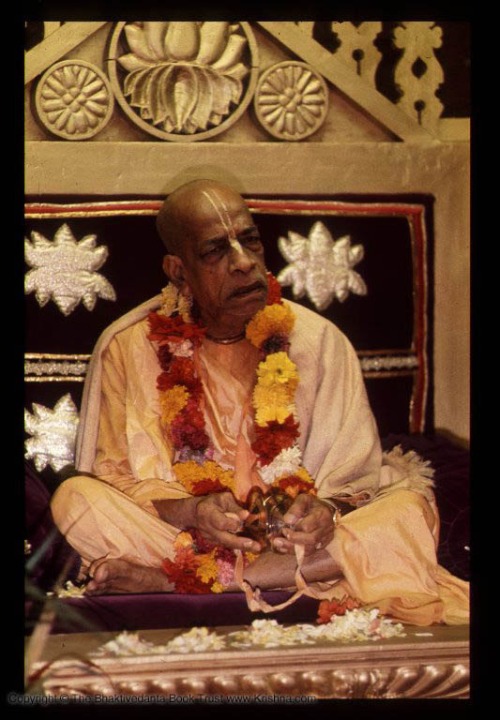




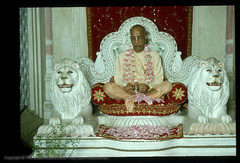
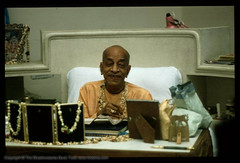


You must be logged in to post a comment.